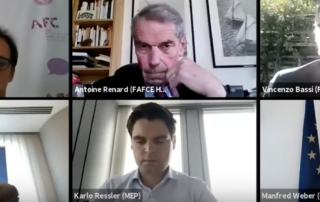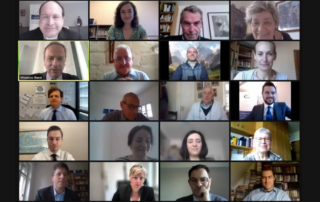European Union
Although family-policies are a national competence and greatly vary across the 27 EU Member-States, the European Union can play an important role in promoting family-friendly policies. FAFCE supports in this direction the daily work of the different EU bodies:
- European Parliament: composed of representatives directly elected by the EU citizens, it participates to produce the EU legislation with the European Council and the European Commission.
- European Council: composed of the EU heads of state or governments, it defines the EU’s political directions and priorities.
- European Commission: composed of designated Commissioners led by a President, it is responsible for proposing legislation, implementing decisions, upholding the EU treaties and managing the day-to-day business of the EU.
- Council of the European Union: composed of Ministers from each Member-States, it meets regularly to discuss specific points on the EU legislation and coordinate EU policies.
- Economic and Social European Committee: composed of representatives of civil society (workers’ and employers’ organisation, interest groups, etc.), this EU advisory body issues opinions on EU issues.
- Committee of the Regions: composed of locally and regionally elected representatives, this EU advisory body produces opinions on EU legislation that directly impact regions and cities.
European Commission Long-Term Vision for Rural Areas Focuses on Social Challenges
5 July 2021 On June 30th, 2021, the European Commission published its long-awaited Long-Term Vision for Rural Areas, which outlines the Commission’s strategy for developing Europe’s rural regions. The document—formally a communication to the European Parliament, the Council of
The EU Slovenian Presidency will “address the negative demographic trends in the EU”
25 June 2021, The EU's Slovenian Presidency will start on the 1st of July 2021 and will continue until the end of 2021. Slovenia is taking over the Council of the EU after Portugal, which took over from Germany.
FAFCE Webinar on “Demographic Change and the Future of Europe”: “Family policies will shape the future of Europe”
4 June 2021 On June 3rd, 2021, FAFCE organised, in cooperation with the European People's Party (EPP) working group on ‘Intercultural and religious dialogue’, a Webinar on the topic of demographic change and the future of Europe. EPP Group
PRESS RELEASE | FAFCE Board Members adopt a Resolution on “The Family is the Democratic and Demographic Future of Europe”
Not only does the family constitute the first school of social and civic life by teaching children how to interact with others in a respectful and complementary manner based on compromise, it also affirms the importance of these values for parents and grandparents, who learn to make sacrifices for others and experience the unique freedom created through responsibility.
EU Parliament Approves Initiative on “Reversing demographic trends in EU regions using cohesion policy instruments”
25 May 2021, On Thursday, 20 May 2021, the European Parliament adopted a report on “Reversing demographic trends in EU regions using cohesion policy instruments" (Rapporteur: Daniel Buda, EPP, Romania). The report marks an positive step towards a more
INVITATION | Webinar on Demographic Change and the Future of Europe (3 June 2021, 16.30-17.30 CEST)
The Federation of Catholic Family Associations in Europe, in cooperation with The EPP Working group 'Intercultural and religious dialogue' invites you to a Webinar on Demographic Change and the Future of Europe Thursday, 3 June 2021 16.30-17.30 (Brussels time)
European Parliament Calls to Recognise the Role of the Family in the European Child Guarantee
Brussels, 12 May 2021 On March 24th, 2021, the European Commission published its proposal for a European Child Guarantee, a key part of the European Union’s effort to eliminate child poverty and social exclusion. A previous FAFCE article detailed
Launch of the Atlas of Demography, the EU database on Demography and Ageing in Europe
29 April 2021, The European Commission Vice-President Dubravka Suica (for Democracy and Demography), and Commissionner Mariya Gabriel (for Innovation, Research, Culture, Education and Youth) launched this morning the long awaited Atlas of Demography. Produced by the Joint
Recognition of Parenthood for Cross-Border Family Situations: FAFCE’s President urges President von der Leyen to protect the best interests of the child
27 April 2021, During her State of the Union address in September 2020, EU Commission President Ursula Von Der Leyen declared “if you are parent in one country, you are parent in every country.” This statement is
FAFCE Contributes to the Implementation of the EU’s Green Paper on Ageing
23 April 2021 On 21 April 2021, FAFCE contributed to the European Commission’s public consultation on the Green Paper on Ageing (click to download: FAFCE Contribution Green Paper on Ageing Questionnaire). The European Commission had invited stakeholders and the













